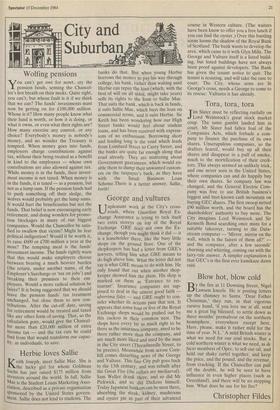City and
Wolfing pensions you can't get owt for nowt, cry the pension funds, sensing the Chancel- lor's hot breath on their necks. Quite right, you can't, but whose fault is it if we think that we can? The funds' investments must now be getting on for £100,000 million. Whose is it? How many people know what their fund is worth, or how it is doing, or what it owns, or even what their rights are? How many exercise any control, or any choice? Everybody's money is nobody's money, and no wonder the Treasury is tempted. When money goes into funds, employers charge contributions against tax, without their being treated as a benefit in kind to the employees — whose own contributions are also allowed against tax. While money is in the funds, their invest- ment income is not taxed. When money is in the funds, it is taxed -- as a pension, but not as a lump sum. If the pension funds had to push something off their sledge, the wolves would probably get the lump sums. It would hurt the beneficiaries but not the funds. That belief is now encouraging early retirement, and doing wonders for promo- tion blockages in many of our biggest companies. Would the Chancellor be satis- fied to swallow that victim? Might he fear political indigestion? Would it be worth it, to raise £600 or £700 million a year at the most? The tempting meal is the funds' investment income. The fupds rightly warn that this would make employers choose between bearing a much heavier burden (the return, under another name, of the Employer's Surcharge or 'tax on jobs') and breaking their promises to their em- ployees. Would a more radical solution be fairer? It is being suggested that we should leave the pension funds' tax treatment unchanged, but close them to new con- tributions. After the cut-off date, saving for retirement would be treated and taxed like any other form of saving. That, so the calculation goes, would give the Chancel- lor more than £20,000 million of extra income tax — and the tax cuts he could find from that would transform our capac- ity, as individuals, to save.


















































 Previous page
Previous page